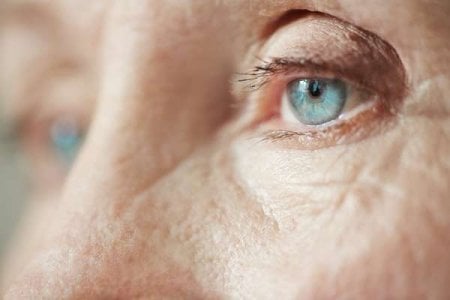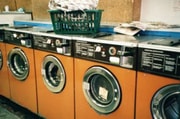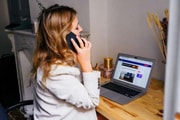This pocket-sized gadget could transform your smartphone into a powerful skin cancer detector
In a world where technology is advancing at a breakneck pace, it's heartening to see innovations that can have a profound impact on our health and well-being.
For Australians, particularly those over 60 who have spent a fair share of their lives under the harsh Aussie sun, skin cancer is a very real concern. The statistics are sobering: Australia has the highest incidence of melanoma in the world, with approximately 16,800 people diagnosed each year.
But what if your smartphone could help in the early detection of skin cancer?
Enter the groundbreaking gadget currently being tested at the Prince of Wales Hospital in Sydney.
This nifty device, which can be clipped onto a smartphone, has the potential to revolutionise the way we monitor our skin health.

The gadget works in tandem with a specialised app, taking a photo of the user's eye to measure the amount of UV damage sustained.
This is significant because UV exposure is a major risk factor for skin cancer.
The technology behind this device is not entirely new; it's based on a desktop version also developed by the same team at the Prince of Wales Hospital.
However, the portability and accessibility of a smartphone-compatible version could mean earlier and more widespread detection of skin cancer risk.
Professor Minas Coroneo and his team have been the driving force behind this innovation.
They were inspired by observations linking non-cancerous growths on the eye's surface, known as pterygium, to later diagnoses of skin cancer.
This correlation was first noted by an observant ophthalmologist who saw a pattern in patients developing pterygium in their late teens and then skin cancer about a decade later. This led to the development of the tool as a biomarker for sun exposure.
‘He had lots of people with pterygium and he noticed they got the Pterygium in their late teens and then skin cancer ten years later,’ Professor Coroneo stated.
The upcoming trial with 100 participants will be crucial in determining the effectiveness of the smartphone gadget compared to its desktop counterpart.
If successful, this could be a game-changer for early skin cancer detection. After all, when melanoma is caught early, it has a 90 per cent cure rate post-surgery, according to the Melanoma Institute Australia.
Imagine the peace of mind that could come with having a convenient, easy-to-use tool right in your pocket, capable of alerting you to potential skin cancer risks.
It's a reminder of how technology, often criticised for distancing us from the real world, can also bring us closer to taking better care of ourselves.
As we await the results of the trial, it's important to remember that while technology can aid in detection, it should not replace regular check-ups with a healthcare professional.
Still, the potential for this device to supplement professional medical advice and empower individuals to monitor their own health is truly exciting.
In the meantime, we encourage you to continue practising sun safety and to get regular skin checks.
You can watch the device demonstration here:
Source: 9 News Australia/YouTube
 What are your thoughts on this new technology? Would you use a smartphone gadget to check your skin cancer risk? Share your opinions and experiences in the comments below—we'd love to hear from you!
What are your thoughts on this new technology? Would you use a smartphone gadget to check your skin cancer risk? Share your opinions and experiences in the comments below—we'd love to hear from you!
For Australians, particularly those over 60 who have spent a fair share of their lives under the harsh Aussie sun, skin cancer is a very real concern. The statistics are sobering: Australia has the highest incidence of melanoma in the world, with approximately 16,800 people diagnosed each year.
But what if your smartphone could help in the early detection of skin cancer?
Enter the groundbreaking gadget currently being tested at the Prince of Wales Hospital in Sydney.
This nifty device, which can be clipped onto a smartphone, has the potential to revolutionise the way we monitor our skin health.

A new device that can be attached to a smartphone is undergoing testing to detect early signs of skin cancer. Image source: Freepik
The gadget works in tandem with a specialised app, taking a photo of the user's eye to measure the amount of UV damage sustained.
This is significant because UV exposure is a major risk factor for skin cancer.
The technology behind this device is not entirely new; it's based on a desktop version also developed by the same team at the Prince of Wales Hospital.
However, the portability and accessibility of a smartphone-compatible version could mean earlier and more widespread detection of skin cancer risk.
Professor Minas Coroneo and his team have been the driving force behind this innovation.
They were inspired by observations linking non-cancerous growths on the eye's surface, known as pterygium, to later diagnoses of skin cancer.
This correlation was first noted by an observant ophthalmologist who saw a pattern in patients developing pterygium in their late teens and then skin cancer about a decade later. This led to the development of the tool as a biomarker for sun exposure.
‘He had lots of people with pterygium and he noticed they got the Pterygium in their late teens and then skin cancer ten years later,’ Professor Coroneo stated.
The upcoming trial with 100 participants will be crucial in determining the effectiveness of the smartphone gadget compared to its desktop counterpart.
If successful, this could be a game-changer for early skin cancer detection. After all, when melanoma is caught early, it has a 90 per cent cure rate post-surgery, according to the Melanoma Institute Australia.
Imagine the peace of mind that could come with having a convenient, easy-to-use tool right in your pocket, capable of alerting you to potential skin cancer risks.
It's a reminder of how technology, often criticised for distancing us from the real world, can also bring us closer to taking better care of ourselves.
As we await the results of the trial, it's important to remember that while technology can aid in detection, it should not replace regular check-ups with a healthcare professional.
Still, the potential for this device to supplement professional medical advice and empower individuals to monitor their own health is truly exciting.
In the meantime, we encourage you to continue practising sun safety and to get regular skin checks.
You can watch the device demonstration here:
Source: 9 News Australia/YouTube
Key Takeaways
- Medical experts at the Prince of Wales Hospital in Sydney are testing a smartphone gadget that assesses UV damage to the eye, potentially indicating skin cancer risk.
- The phone camera attachment works in conjunction with a specialised app to analyse photos of the person's eye.
- The gadget is being trialled on 100 participants to determine if it's as effective as a desktop version previously developed by the same team.
- The tool was devised as a biomarker for sun exposure, building on observations linking early eye damage with a higher risk of developing skin cancer later in life.







